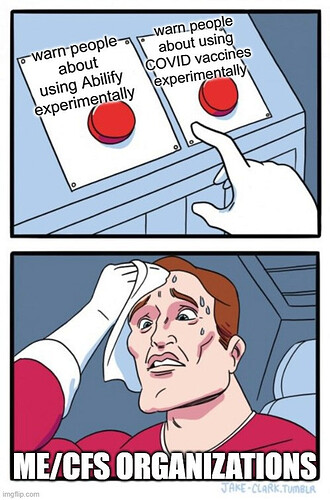This post will summarize experimental treatments mentioned in the paper. The auto-antibody stuff is a rehash of a treatment that didn’t pan out (rituximab), so I talk about those treatments at the end.
Low-dose Abilify and to a lesser degree Ritalin (Methylphenidate) have stuck around in the ME/CFS world for a while. They definitely aren’t cures. There may or may not be something to them. While patients have tried Abilify, I’m not aware of good data on it so who knows if it’s helpful?
These are all experimental drugs so it shouldn’t be surprising that there isn’t a lot of data on the drugs mentioned.
Inflammation
Kinase inhibitors
These interfere with specific parts of the immune system so that there is less inflammation. A number of these drugs exist.
Antihistamines (H1 + H2)
These drugs are fairly popular right now so I’ll skip over them.
Minocycline
There’s 1 paper with 6 citations that talks about this drug: https://doi.org/10.2169/internalmedicine.6082-20
- Discontinuation rate in the first few days was 38% (!!!). That seems really high.
- “favorable effects were observed with a decrease in the performance status score of ≥2 points in 27 patients (27%)”
Perhaps you are more likely to discontinue this drug early than you are to see favorable effects.
Metformin
This is a popular drug used to treat diabetes. Because a lot of people take it naturally, we might be able to get data from existing patient experiences.
In any case, the Scheibenbogen paper links to the COVID-OUT study about metformin or ivermectin or fluvoxamine being used to treat acute COVID. The COVID-OUT study found that only metformin seems to prevent Long COVID. However, the COVID-OUT trial is… controversial and its results may not necessarily be reliable. I don’t have time to figure it out. In any case, the study didn’t look at giving metformin late to people who’ve had Long COVID for a while. That would be more relevant to the treatment of people with chronic illness.
Vascular
Nebivolol
This study looked at patients recovering from COVID who also complained about shortness of breath (dyspnoea). They were not necessarily Long COVID patients.
Seemed to be effective in lowering the dyspnoea score in patients.
https://www.mrmjournal.org/mrm/article/view/886
Nicotine (e.g. nicotine patches)
The study’s authors claim that Long COVID is really easy to treat and that some patients quickly achieved complete remission. ![]()
Treating several individuals suffering from post-COVID-19 syndrome with a nicotine patch application, we witnessed improvements ranging from immediate and substantial to complete remission in a matter of days.
The PDE5 inhibitor sildenafil
A small study was already performed with the PDE5 inhibitor sildenafil in ME/CFS showing a significant improvement of fatigue in 5 treated patients compared to 6 receiving placebo (NCT00598585). There is also evidence from various small trials in ME/CFS that the neuromodulators low dose aripiprazole and methylphenidate can have efficacy (46, 47).
Pyridostigmine
There was a RCT of this drug being used in ME/CFS patients, but they only measured a small slice of the patient’s ME/CFS. So the paper’s abstract doesn’t really say whether or not the ME/CFS patients got better.
Right now, the evidence for this drug is really really thin.
Neuromodulation
Guanfacine (plus NAC)
- reduced the cognitive deficits (“brain fog”) associated with long-COVID19 in eight out of twelve patients.
- Two patients stopped treatment due to hypotension and/or dizziness, common side effects of guanfacine, and two patients were lost to follow-up.
- The remaining eight patients reported improved working memory, concentration and executive function, including the resumption of normal workloads.
weak trial design… ideally a more reliable trial would confirm the findings.
https://www.sciencedirect.com/science/article/pii/S2667257X22001000
Low dose aripiprazole (Abilify)
One doctor reported his patients’ experience with low dose Abilify after-the-fact (retrospective study), so there may be some bias because he tried other drugs in patients and didn’t report the results of those other drugs (survivorship bias). In any case, ME/CFS patients have been trying low-dose Ability and it’s ok. Their anecdotes don’t seem to be as good as what was published in the study.
It’s possible that it has some benefit in a few people.
Cort Johnson writes about Abilify on his ME/CFS blog, which is biased towards positive reporting on treatments and recovery stories.
3 different ME associations have come out with statements on Abilify as it became trendy in the ME/CFS community.
- Action4ME doesn’t take a strong stance.
 ME Association UK recommends against it.
ME Association UK recommends against it. ANZMES recommends against it.
ANZMES recommends against it.
Methylphenidate (Ritalin), a CNS stimulant and controlled substance
This drug has been tried in ME/CFS patients.
The long-term intake of methylphenidate by CFS patients with concentration difficulties has a positive effect in about one out of three patients.
https://doi.org/10.1080/17843286.2016.1200816
Auto-antibodies
CD20 monoclonal antibodies targeting B-cells
Rituximab was tried in ME/CFS in a randomized clinical trial. Unfortunately the trial failed. Key investigators from the trial haven’t moved on. They still think that similar treatments may be useful in ME/CFS patients.
https://www.jci.org/articles/view/150377
CD19 monoclonal antibodies targeting B-cells
Similar idea to CD20 monoclonal antibodies.
BTK inhibitor
Another drug that monkeys around with the immune system and is used to treat autoimmune disease.
